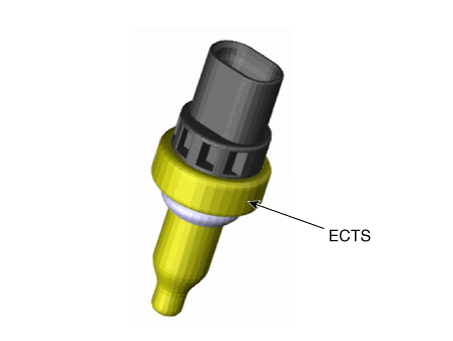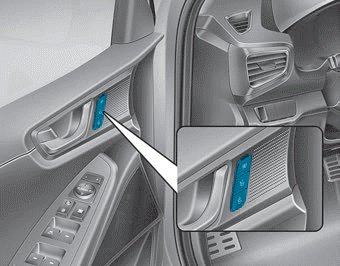Hyundai Ioniq: Engine Control System / Engine Coolant Temperature Sensor (ECTS). Description and operation
Hyundai Ioniq (AE) 2017-2025 Service Manual / Engine Control/Fuel System / Engine Control System / Engine Coolant Temperature Sensor (ECTS). Description and operation
| Description |
Engine Coolant Temperature Sensor (ECTS) is located in the engine coolant passage of the cylinder head for detecting the engine coolant temperature. The ECTS uses a thermistor that changes resistance with the temperature.
The electrical resistance of the ECTS decreases as the temperature increases, and increases as the temperature decreases. The reference +5V is supplied to the ECTS via a resistor in the ECM. That is, the resistor in the ECM and the thermistor in the ECTS are connected in series. When the resistance value of the thermistor in the ECTS changes according to the engine coolant temperature, the output voltage also changes.
During cold engine operation, the ECM increases the fuel injection duration and controls the ignition timing using the information of engine coolant temperature to avoid engine stalling and improve drivability.

 Intake Air Temperature Sensor (IATS). Repair procedures
Intake Air Temperature Sensor (IATS). Repair procedures
Inspection1.Turn the ignition switch OFF.2.Disconnect the IATS connector.3.Measure resistance between the IATS terminals 3 and 4.4.Check that the resistance is within the specification...
 Engine Coolant Temperature Sensor (ECTS). Specifications
Engine Coolant Temperature Sensor (ECTS). Specifications
Specification
Temperature
Resistance (kΩ)
°C
°F
-40-4048...
Other information:
Hyundai Ioniq (AE) 2017-2025 Service Manual: Fly Wheel. Components and components location
C..
Hyundai Ioniq (AE) 2017-2025 Service Manual: Intake Manifold. Repair procedures
Removal and Installation1.Disconnect the battery negative terminal.2.Remove the air cleaner assembly.(Refer to Intake and Exhaust System - "Air Cleaner")3.Disconnect the wiring connectors and harness clamps and remove the wiring protector around the intake manifold...
Categories
- Manuals Home
- 1st Generation Ioniq Owners Manual
- 1st Generation Ioniq Service Manual
- Hybrid battery SOC (State of Charge) gauge
- Reverse Parking Aid Function
- Check brakes/Check regenerative brakes, Check Virtual Engine Sound System
- New on site
- Most important about car
Driver Position Memory System

The Driver Position Memory System is provided to store and recall the following memory settings with a simple button operation.
- Driver's seat position
- Side view mirror position
- Instrument panel illumination intensity
Copyright © 2025 www.hioniqae.com
